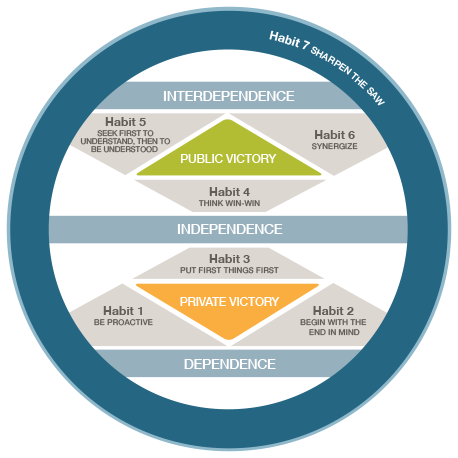I admit, I originally took the 7 Habits course offered by FranklinCovey because my employer offered it for free, and it offered a way to get out of my windowless office…
In taking the course however, I discovered the value and widespread applicability of Stephen Covey’s 7 Habits of Highly Effective People. The paradigms, practices, and principles of the 7 Habits provide a great framework for understanding an individual’s role in any context — including data science.
I previously wrote about David Allen’s Getting Things Done, which provided a practical framework through which to understand the data science project lifecycle — call it the “what”. 7 Habits provides a framework through which to understand the “who” — the data scientist. “7 Habits” has become so ubiquitous that often, people will invoke the name, and then list 7 unrelated/random habits. Or, they’ll list the habits correctly, without the complete context. 7 Habits of Highly Effective People (let’s call it 7H from here on out…) is a paradigm, not a [list]. Don’t worry, though, I’ve got you covered — before getting into the list, we’ll review the foundational framework underlying this paradigm.
The Maturity Continuum

Maturity Continuum from Stephen Covey’s 7 Habits
- Dependence
- Independence
- Interdependence
- Private Victory → Public Victory
The goal of the 7 Habits is to move from the basic child-like state of dependence through the just-graduated-college state of independence, to land in the 7 Habits nirvana of interdependence in which you understand your mutual dependence on others. Achieving independent status from a state of dependence requires mastery of the private victory, and the subsequent achieving of the public victory. In non-fancy terms — you gotta know how to have your house in order before Marie-Kondo-ing other people’s houses!
Dependence
So how does this apply to data science? Well, let’s understand it through roles. Novice data science students (self-guided, textbook learner, youtube video-watcher, or bootcamper, etc.) are in a state of dependence. Like children, we extract resources from module documentation, O’Reilly, StackOverflow, YouTube professors, and Learning Advisors. We’re generally given a path, and follow it. In order to be more effective as data practitioners, however, we’ll have to move out of this phase.
Independence
Advanced data science students and entry-level data scientists/analysts are in a state of independence. These self-starters may be competent and able enough to manipulate data and operate the program of their choice, without assistance from others. If someone fed them data and an appropriately framed question, they could easily create a visualization, regression, or classification that answers that question in isolation, perhaps asking others for help when they need it. This autonomy may be good enough for winning Kaggle competitions, but does not an effective data scientist make.
Interdependence
Practitioners, Professors of the Practice, industry experts, etc. comprise the third and last category of Interdependence. These academics, policy experts, practitioners, and department heads have (theoretically) reached what I’ll call “7 Habits nirvana”: they know that their individual continued success, growth, and development depends on the value delivered to the business, or to others around them. They’re the not only actively engaging others by answering the StackOverflow questions and various community questions, but also amplifying the magnitude of others’ diverse voices.
Now that you’ve read and understood the foundation of the Maturity Continuum, I can share the secret 7 Habits of a Highly Effective Data Scientist. Turns out…they’re the same! Ready?
- Be Proactive
- Begin with the End in Mind
- Put First Things First
- Think Win-Win
- Seek First to Understand, then to Be Understood
- Synergize
- Sharpen the Saw
**Habits 1–3 **will move us from dependence to independence
**Habits 4–6 **will move us from independence to interdependence
**Habit 7 **will bring us to “7H nirvana”
#7-habits #personal-growth #data analysis
